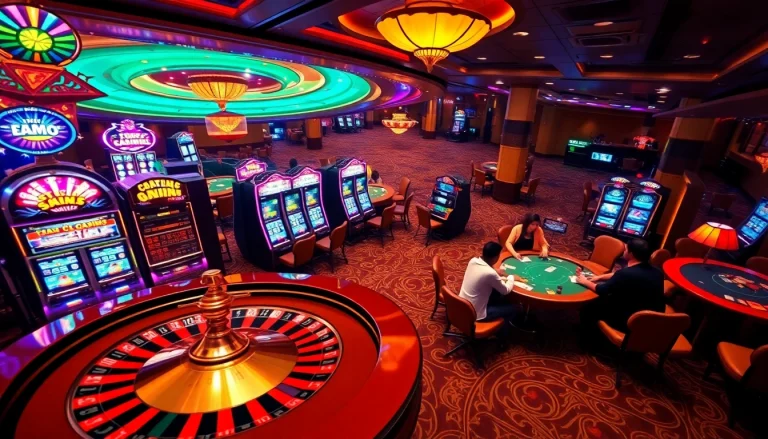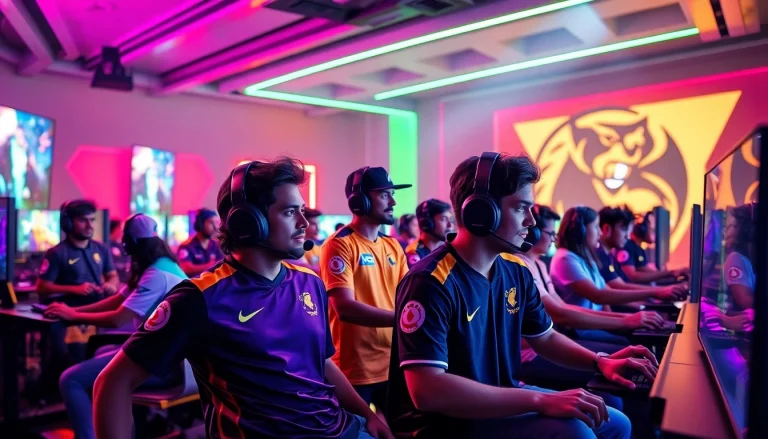Understanding the Casino Landscape in 2025
The Rise of Online Casinos
The landscape of gambling has transformed dramatically over the past few decades, particularly with the rise of online casinos. In 2025, online gambling continues to redefine how players engage with their favorite games. The convenience of betting from the comfort of one’s home, coupled with the expansive selection of games available, has led to a surge in participation. Moreover, technological advancements such as mobile compatibility and live dealer features have significantly enriched the online gaming experience. For instance, players can now enjoy an immersive casino environment through high-definition video streaming, interacting with dealers and other players in real-time.
Notably, the https://nhacaiuytin.place/ platform exemplifies this evolution, presenting an array of games that cater to diverse playing preferences, from poker to slot machines. The adaptability of online casinos ensures that players can find games that suit their individual tastes while enjoying enhanced security and reliability in their gambling practices.
Analyzing Player Preferences
User preferences in gambling are constantly evolving, influenced by demographics, technological innovations, and broader cultural trends. For instance, younger players often gravitate towards mobile gaming options and gamified experiences, favoring platforms that offer quick, engaging gameplay over traditional slow-paced table games. Alternatively, older generations may prefer the nostalgia and social aspects of in-person casino gaming.
Operators are increasingly utilizing data analytics to understand player behavior, leading to personalized recommendations and targeted promotions that enhance user experience. Furthermore, bonuses and loyalty programs have become critical in attracting and retaining players. Casinos that successfully align their offerings with player preferences often see higher conversion rates and customer satisfaction, reinforcing player loyalty amidst a competitive marketplace.
Comparative Study of In-Person vs. Online Gambling
When comparing in-person gambling with online alternatives, each modality presents distinct experiences and advantages. Traditional casinos offer a unique atmosphere characterized by social interaction, entertainment options, and an extravagant ambiance that contributes to a multifaceted gambling experience. Players can engage with dealers and others, participate in live events, and enjoy amenities such as restaurants and entertainment shows.
Conversely, online casinos emphasize convenience and accessibility. Players can gamble on their own time, free from geographical limitations, and engage with a plethora of games just by logging onto a website or app. However, the lack of in-person interaction and the tactile elements of gaming can result in a less immersive experience. As hybrid models, such as live dealer games, emerge, they aim to bridge the gap between these two worlds, blending the excitement of a physical casino with the convenience of online play.
Top Gambling Strategies for Maximum Success
Bankroll Management Techniques
One of the essential elements of successful gambling is effective bankroll management. This involves setting aside a specific amount of money dedicated solely for gambling and making informed decisions about how to allocate that budget across various games. By determining session limits, players can mitigate the risk of loss and prolong their gambling experience. This means setting daily, weekly, and monthly limits and adhering to them rigidly to avoid the common pitfall of chasing losses.
Additionally, players should differentiate between their bankroll and any winnings they might accrue. It’s advisable to separate winnings from the original bankroll to minimize the chance of overall loss. A popular strategy is to employ the 50/30/20 rule where 50% of the bankroll is for playing, 30% for saving, and 20% for expenses. This method allows players to enjoy their gambling activities while maintaining financial control and discipline.
Understanding Game Odds and House Edge
Understanding the odds and house edge associated with different games is pivotal in formulating effective gambling strategies. Odds represent the likelihood of a specific outcome occurring within a game, while the house edge defines the casino’s advantage over the player in any given game. For example, in a game like blackjack, the house edge can be as low as 0.5% with optimal player strategy, whereas slot machines may feature house edges upwards of 15% to 20% depending on design and payout structures.
Analyzing these factors helps players make informed game selections and improve their chances for long-term success. Players should particularly focus on games with more favorable odds and learn the optimal strategies to leverage the best potential outcomes. Furthermore, studying paytables and specific game rules can provide insights that enhance gameplay and promote better financial decision-making.
Adapting Strategies for Different Casino Games
Every casino game requires distinct strategies tailored to its unique rules and gameplay mechanics. For example, poker relies heavily on skill, psychology, and strategy over luck, requiring players to master betting strategies and opponent reading skills. In contrast, games like roulette are predominantly chance-based environments where players may adopt betting systems like Martingale or Fibonacci to manage their wagers effectively.
Slot machines, on the other hand, focus on understanding paylines and RTP (Return to Player) percentages, enabling players to choose games with higher payout probabilities. Adapting strategies to the game’s context and staying informed about trends, patterns, and tactics helps players enhance their gaming skills and ultimately optimize their betting outcomes.
Casino Reviews: Finding Your Ideal Gambling Venue
Criteria for Evaluating Online Casinos
Selecting the right online casino can significantly impact your gambling experience. As the market expands, players benefit from knowing the key criteria to evaluate casinos effectively. Licensing and regulation are paramount, ensuring that the casino operates within the law and upholds remote gambling standards. Reputable sites will display their licensing information conspicuously.
Security measures, such as encryption protocols, also play a crucial role in safeguarding personal and financial data. Additionally, evaluating the gaming portfolio, payment methods, customer service quality, and bonus offerings allows players to gauge whether a casino meets their gaming needs and preferences. Comprehensive reviews and comparison sites can provide valuable insights and user experiences that further streamline the selection process.
What Makes a Casino Reputable?
Determining the credibility of a casino involves assessing various factors that reflect its reputation within the gambling community. These include positive user reviews, industry awards, and memberships in recognized gambling organizations. Transparent practices, such as clearly stated terms and conditions, along with prompt and effective customer support responses, also signal a trustworthy establishment.
Furthermore, the casino’s track record with payout times and financial stability can heavily influence player trust. Established casinos that have been operational for years typically exhibit stability and adherence to industry standards. Newer sites may also prove trustworthy, so it’s essential for players to conduct thorough research, rely on trusted sources, and stay updated on the latest gambling regulations and industry news.
Spotlighting Customer Feedback and Experiences
Customer feedback serves as a vital resource in assessing the reliability and service quality of online casinos. Players frequently share their experiences on forums, review sites, and social media platforms, providing insights on aspects such as game variety, user interface, and payment processing efficiency. Monitoring this feedback helps potential gamblers understand what to expect from different platforms.
Moreover, testimonials regarding bonus promotions and withdrawal processes can reveal the authenticity of a casino’s claims. Engaging with the online gaming community not only offers additional perspectives but also aids players in making informed decisions, ensuring a more satisfying gambling experience.
The Importance of Responsible Gambling Practices
Recognizing Signs of Problem Gambling
The thrill of gambling can sometimes lead players to engage in excessive behavior that impacts their financial stability and emotional well-being. Recognizing the signs of problem gambling is essential and can include spending more money than initially intended, prioritizing gambling over other important life activities, or feeling a persistent urge to gamble despite negative consequences.
Additionally, players should pay attention to their emotional and psychological states before and after gambling sessions. If gambling leads to anxiety, mood swings, or conflict with family and friends, these are red flags that warrant immediate attention. The gambling community has increasingly embraced the importance of mental health, encouraging players to approach gambling with awareness and mindfulness.
Setting Personal Betting Limits
Establishing personal betting limits is a fundamental strategy to promote responsible gambling. Players are encouraged to set strict limits on their deposits, wagers, and session durations to maintain control over their gaming activities. Establishing a pre-determined budget for gambling ensures that players only risk what they can afford to lose, minimizing the risk of financial crises.
Many online casinos provide tools such as deposit limits, session time reminders, and self-exclusion options, empowering players to take proactive steps towards responsible gambling. Leveraging these resources helps build a healthy relationship with gambling and promotes long-term enjoyment of gaming without adverse effects.
Resources and Support for Gamblers
Numerous organizations and platforms provide resources and support for gamblers who may face challenges. Hotlines and support groups, such as Gamblers Anonymous or the National Council on Problem Gambling, offer confidential assistance to individuals in distress. These platforms facilitate discussions and provide coping strategies for those affected.
Moreover, online casinos that prioritize responsible gambling often have links to these resources on their websites, ensuring players have access to help if needed. Awareness of available support can significantly impact recovery and help individuals regain a balanced approach to gambling.
Future Trends in Gambling: What’s Next?
Emerging Technologies in the Casino Space
The gambling industry is poised for continued evolution as emerging technologies transform the casino experience. Advances in artificial intelligence (AI) and machine learning are enabling casinos to offer personalized gaming experiences, analyze player behavior, and curtail fraudulent activities. Enhanced data analysis also allows operators to tailor promotions, ensuring that they resonate with their player base.
Blockchain technology is also gaining traction in the gambling sector, promoting transparency and security. Decentralized platforms utilizing smart contracts provide players with a higher level of trust regarding fairness and payouts. This trend is expected to grow as more players recognize the benefits of blockchain in ensuring data integrity and transaction safety.
The Role of Virtual Reality in Gambling
Virtual Reality (VR) is set to revolutionize the digital gambling landscape, offering players immersive gaming experiences that closely mimic real-life casino environments. By donning VR headsets, players can interact with dealers, play alongside friends in virtual spaces, and engage in situational gameplay that increases excitement and engagement.
These advancements not only enhance entertainment value but also penetrate new markets, attracting a younger demographic eager for cutting-edge gaming experiences. As VR technology matures, the potential for online casinos to create lifelike environments tailored to player preferences appears limitless.
Predictions for Gambling Legislation Changes
The gambling regulatory environment is continually adapting to meet the needs of the industry and its consumers. As more jurisdictions explore the legalization of online gambling and sports betting, significant changes in legislation are anticipated in the coming years. This shift stands to cultivate a more inclusive landscape that embraces varied gaming formats while adhering to responsible practices.
Key areas of focus include age restrictions, anti-money laundering practices, and measures to protect vulnerable players. Moreover, the growth of e-sports betting necessitates a reevaluation of regulations to ensure fairness and integrity. Stakeholders must work collaboratively to create frameworks that foster responsible gambling while still encouraging innovation and growth in the sector.



















